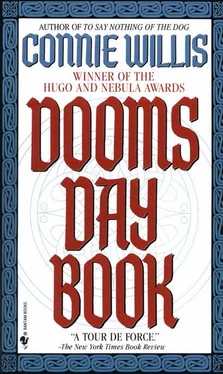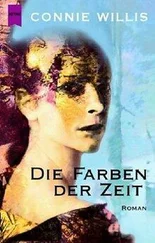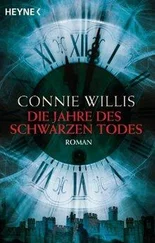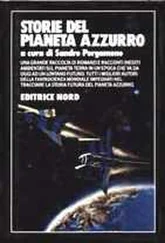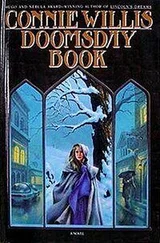“You’re only supposed to take them every three hours,” Colin said, “and you’re not supposed to take them without water.”
“Then fetch me some water,” he snapped.
Colin looked to Kivrin for support, but she was still standing on the other side of Roche’s body, watching Dunworthy warily.
“Now,” Dunworthy said, and Colin ran out, his boots echoing on the stone floor. Dunworthy looked across at Kivrin, and she took a step back.
“It isn’t the plague,” he said. “It’s a virus. We were afraid you had been exposed to it before you came through and had come down with it. Did you?”
“Yes,” she said, and knelt beside Roche. “He saved my life.”
She smoothed the purple blanket, and Dunworthy realized it was a velvet cloak. It had a large silk cross sewn in the center of it.
“He told me not to be afraid,” she said. She pulled the cloak up over his chest, under his crossed hands, but the action left his feet, in thick, incongruous sandals, uncovered. Dunworthy took the burlap bag from around his shoulders and spread it gently over the feet, and then stood up, carefully, holding onto the statue so he wouldn’t fall again.
Kivrin patted Roche’s hands under the cloak. “He didn’t mean to hurt me,” she said.
Colin came back in with a bucket half-full of water he must have found in a puddle. He was breathing hard. “The cow attacked me!” he said, scooping a filthy dipper out of the bucket. He emptied the aspirin into Dunworthy’s hand. There were five tablets.
Dunworthy took two of them, swallowing as little of the water as he could, and handed the others to Kivrin. She took them from him solemnly, still kneeling on the floor.
“I couldn’t find any horses,” Colin said, handing Kivrin the dipper. “Just a mule.”
“Donkey,” Kivrin said. “Maisry stole Agnes’s pony.” She gave Dolin the dipper and took hold of Roche’s hand again. “He rang the bell for everyone, so their souls could go safely to heaven.”
“Don’t you think we’d better be going?” Colin whispered. “It’s almost dark out.”
“Even Rosemund,” Kivrin said as if she hadn’t heard. “He was already ill. I told him there wasn’t time, that we had to leave for Scotland.”
“We must go now,” Dunworthy said, “before the light fails.”
She didn’t move or let go of Roche’s hand. “He held my hand when I was dying.”
“Kivrin,” he said.
She laid her hand on his cheek and got to her knees. Dunworthy offered her his hand, but she stood up by herself, her hand pressed to her side, and walked down the nave.
At the door she turned and looked back into the darkness. “He told me where the drop was when he was dying, so I could go back to heaven. He told me he wanted me to leave him there and go, so that when he came I would already be there,” she said, and went out into the snow.
The snow fell silently, peacefully on the stallion and the donkey waiting by the lychgate. Dunworthy helped Kivrin onto the stallion, and she did not flinch away from his touch as he had been afraid she would, but as soon as she was up, she leaned away from his grasp and took hold of the reins. As soon as he removed his hands, she slumped back against the saddle, her hand against her side.
Dunworthy was shivering now, clenching his teeth against it so Colin wouldn’t see. It took three tries to get him onto the donkey, and he thought he might slip off at any minute.
“I think I’d better lead your mule,” Colin said, looking disapprovingly at him.
“There isn’t time,” Dunworthy said. “It’s getting dark. You ride behind Kivrin.”
Colin led the stallion over to the lychgate, climbed up on the lintel, and scrambled up behind Kivrin.
“Do you have the locator?” Dunworthy said, trying to kick the donkey without falling off.
“I know the way,” Kivrin said.
“Yes,” Colin said. He held it up. “And the pocket torch.” He flicked it on, and then shone it all around the churchyard, as if looking for something they might have left behind. He seemed to notice the graves for the first time.
“Is that where you buried everybody?” he said, holding the light steady on the smooth white mounds.
“Yes,” Kivrin said.
“Did they die a long time ago?”
She turned the stallion and started it up the hill. “No,” she said.
The cow followed them partway up the hill, its swollen udders swinging, and then stopped and began lowing pitifully. Dunworthy looked back at it. It mooed uncertainly at him, and then ambled back down the road toward the village. They were nearly to the top of the hill, and the snow was letting up, but below, in the village, it was still snowing hard. The graves were covered completely, and the church was obscured, the bell tower scarcely visible at all.
Kivrin did not so much as glance back. She rode steadily forward, sitting very straight, with Colin on behind her, holding not to Kivrin’s waist but to the high back of the saddle. The snow came down fitfully, and then in single flakes, and by the time they were in thick woods again, it had nearly stopped.
Dunworthy followed the horse, trying to keep up with its steady gait, trying not to give way to the fever. The aspirin was not working—he had taken it with too little water—and he could feel the fever beginning to overtake him, beginning to shut out the woods and the donkey’s bony back and Colin’s voice.
He was talking cheerfully to Kivrin, telling her about the epidemic, and the way he told it, it sounded like an adventure. “They said there was a quarantine and we’d have to go back to London, but I didn’t want to do that. I wanted to see Great-Aunt Mary. So I sneaked through the barrier, and the guard saw me and said, ‘You there! Stop!’ and started to chase me, and I ran down the street and into this alley.”
They stopped, and Colin and Kivrin dismounted. Colin took off his muffler, and she pulled up her blood-stiff smock and tied it around her ribs. Dunworthy knew the pain must be even worse than he’d thought, that he should try at least to help her, but he was afraid that if he got down off the donkey, he would not be able to get back on.
Kivrin and Colin mounted again, she helping him up, and they set off again, slowing at every turning and side path to check their direction, Colin hunching over the locator’s screen and pointing, Kivrin nodding in confirmation.
“This was where I fell off the donkey,” Kivrin said when they stopped at a fork. “That first night. I was so sick. I thought he was a cutthroat.”
They came to another fork. It had stopped snowing, but the clouds above the trees were dark and heavy. Colin had to shine his torch on the locator to read it. He pointed down the right– hand path, and got on behind Kivrin again, telling her his adventures.
“Mr. Dunworthy said, ‘You’ve lost the fix,’ and then he went straight over into Mr. Gilchrist and they both fell down,” Colin said. “Mr. Gilchrist was acting like he’d done it on purpose, he wouldn’t even help me cover him up. He was shivering like blood, and he had a fever, and I kept shouting, ‘Mr. Dunworthy! Mr. Dunworthy!’ but he couldn’t hear me. And Mr. Gilchrist kept saying, ‘I’m holding you personally responsible.’”
It began to spit snow again, and the wind picked up. Dunworthy clung to the donkey’s stiff mane, shivering.
“They wouldn’t tell me anything ,” Colin said, “and when I tried to get in to see Great-Aunt Mary, they said, ‘We don’t allow children.’”
They were riding into the wind, the snow blowing against Dunworthy’s cloak in freezing gusts. He leaned forward till he was nearly lying on the donkey’s neck.
Читать дальше
